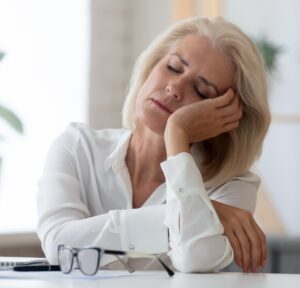
On a normal day, most adults lead very busy lives. During the holidays, when you add in the shopping, decorating, post office runs, social activities, and cooking, well… it’s no wonder that adults get less sleep during the holiday season.
Although it can vary from one individual to another, adults should get an estimated 7 to 9 hours of sleep each night. Yet, feeling dragged down during the day isn’t solely based on the time spent in bed. It’s the quality of sleep your body gets that can have a significant impact on your energy level, as well as many more aspects of your health.
First, understand why uninterrupted sleep is so important.
In a July 2021 article in Good Housekeeping (“Experts Break Down REM Sleep and Explain How Much You Really Need”), the need for REM (rapid eye movement) sleep is addressed. Each REM sleep period occurs in three stages, with every stage lasting about 90 minutes or more with non-REM sleep occurring in the first 70-75% of total sleep time. For a good night’s sleep, the REM cycle pattern generally occurs 3 times a night.
When these multiple REM cycles are compromised, health risks include a higher risk of cardiovascular disease, diabetes, dementia, and depression, among other sleep-related issues like chronic sleep apnea or insomnia.
Let’s now look at how sleep apnea can interfere with REM sleep. Findings of one study examined “the effect of REM-related obstructive sleep apnea on motor memory consolidation as well as on mood states.” Results showed that apneas occurring only during REM sleep had a detrimental impact on emotional health.
Combined with the increased risk of serious disease such as heart disease and diabetes, the emotional risks and brain health risks (dementia and depression), tending to your quality of sleep should take precedence in your wellness commitment.
Obstructive Sleep Apnea (OSA) is a common sleep disorder caused by the collapse of the airway during sleep. This results in intermittent pauses in air intake followed by brief arousals from sleep. These pauses can occur for up to a minute each and over a hundred times per night.
Common symptoms of sleep apnea include daytime fatigue, lack of alertness, reduced energy, nodding off easily (even behind the wheel), feeling hungry more often, and being more accident prone.
The challenge is early diagnosis. Many people write their symptoms off to stress, a bad mattress, or their own sleep disruption from heavy snoring. Fortunately, diagnosis can be done through an at-home test that is read by a Sleep Medicine physician. Too, treatment may not require you to wear a CPAP device.
For people who have mild to moderate levels of sleep apnea, a small, custom-made oral appliance may be an effective solution.
Using our Cone Beam imaging technology, we can detect blockages in airway passages. In our Shelby Twp dental office, our patients are also provided with the advanced skills of a neuromuscular dentist.
The neuromuscular approach to treating sleep apnea can have a significant difference in the construction of properly-contoured appliances. Through this individualized approach, our patients enjoy a truly effective device that is small and comfortable so it supports restful sleep.
If you suspect sleep apnea or snore loudly, begin with a free consultation by calling our Shelby Township dental office at (586) 739-2155 or tap HERE to begin. If cost of treatment is a concern, we offer several payment plans that are manageable to most budgets. Most of these are interest-free with no down payment required.
You may also want to view our immense array of technology at: DrBarbatTechnology
And get to know my commitment to you at: MeetDrBarbat
Journal of Clinical Sleep Medicine (March 2020): https://pmc.ncbi.nlm.nih.gov/articles/PMC7075098/